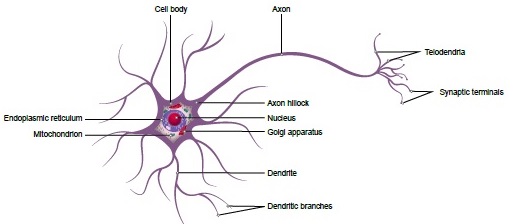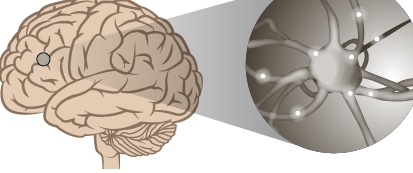COURSE STRUCTURE
There are ten lessons in this module as follows:
Lesson 1
Foundations of Neuropsychology - What is neuropsychology? The Information Processing Approach. Studying the human mind, techniques used, brain scans, animal studies, methods of investigating the brain, psychological tests, Stroop test.
Lesson 2
Neurophysiology – Neurons, parts of a neuron, neurotransmitters, effects of neurotransmitters, neurotransmitters and their effects, endorphins, disorders associated with neurotransmitters, glia cells, Schwann cells, nerve impulse, synaptic transmission, nerve impulse, neuromuscular transmission.
Lesson 3
Neuroanatomy – the nervous system, parts of the central nervous system, the brain, the spinal cord, spinal nerves, blood brain barrier, peripheral nervous system, autonomic nervous system, sensory somatic nervous system, spinal nerves, cranial nerves, how the nervous system works (a summary), problems with brain functioning, cerebral palsy, brain tumours, injuries to the head, epilepsy, headaches, mental illness, meningitis and encephalitis.
Lesson 4
Laterality and Callosal Syndromes – Brain lateralisation, left handedness, cognitive neuropsychology, callosal syndrome, complete severance, split brain, complete severance, split brain syndrome, lobotomy, psychosurgery, Dual brain theory.
Lesson 5
Cognition, Personality and Emotion – Brain damage, emotion and moods, Phineas Gage, brain damage and emotion, frontal lobe, higher level functioning, the Limbic system, neurotransmitters, neuropsychology and emotions research.
Lesson 6
Perception Disorders – Hemispatial neglect, causes of hemispatial neglect, auditory perceptual disorder, agnosia, visual agnosia, types of visual agnosia, prosopagnosia, simultanagnosia, optic aphasia, hallucinogen persisting perception disorder.
Lesson 7
Motor Disorders – Parkinson’s Disease, motor disorders resulting from traumatic brain injury, non-traumatic and/or genetic paediatric movement disorders, cerebral palsy, motor conditions, Gerstmann’s Syndrome, apraxia, motor skills disorder, motion dyspraxia, neural transplants and Parkinson’s Disease, gene therapy, how does gene therapy work, ethical issues surrounding gene therapy,
Lesson 8
Language – Broca’s area, Wernicke’s area, speech, language, speech and language disorders, apraxia, aphasia, stuttering, neurogenic stuttering, Troyer syndrome, speech disorders.
Lesson 9
Dementia – Kinds of dementia, Alzheimer’s Disease, Vascular Dementia, Multi-infarct Dementia, Parkinson’s Disease, Pick’s Disease, Dementia with Lewy Bodies, Huntingdon’s Disease, Pseudo-Dementia, spotting dementia and other conditions,
Lesson 10
Neurodevelopment - Major processes of neurodevelopment, neurogenesis, migration, differentiation, apoptosis, aborisation, synaptogenesis, Asperger Syndrome, neuroplasticity and brain damage.
Aims
- To describe the relevance of neuropsychology to managing psychological disorders.
- To explain the physiology of the nervous system.
- To describe the anatomy of the nervous system.
- To describe how conditions within the brain affect the way in which a person is physically capable or incapable of performing a variety of different tasks.
- To explain how various aspects of a person’s thought processes may vary according to that person’s neurobiology.
- To describe a variety of perceptual disorders.
- To explain a variety of motor disorders.
- To explain the neuropsychology of language.
- To differentiate between different dementias.
- To explain aspects of development in neuropsychological terms.
EXAMPLES OF WHAT YOU MAY DO IN THIS COURSE
- Learn about the development of Neuropsychology and techniques used in human neuropsychological studies.
- Describe the Neuroanatomy of -
-Brain stem
-Cerebellum and cerebral cortex
-Organisation of the cerebral cortex
-Cranial nerves, brain covering, ventricular system, arteries
-Brain malfunction
-Visual system
-Other systems.
- Determine why there is laterality.
- Discuss callosal syndrome.
- Discuss and compare theories of frontal lobe function.
- Contrast normal aspects and abnormal aspects of emotion from a neuropsychological perspective.
- Develop a diagnostic table of perceptual disorders.
- Determine how the brain perceives faces.
- Discuss language formation.
- Describe language disorders.
- Develop a table of kind of dementia.
- Learn how recovery of function is affected across age spans.

Student Comment
" The online courses are very easy to use and follow. Prompt friendly replies from tutor to any queries. Course structure flows freely. Very satisfied with course and results..."
- Diana (completed ACS Online course in Intro to Psych and Psych & Counselling)

What Next?
The study of neuropsychology provides us with a greater understanding of how the brain and body interact, affecting our behaviour. This course is therefore useful for anyone involved in health, fitness, psychology etc. Improve your understanding of the functions of the brain.
You can enrol today by clicking the “Enrol Now” button above.
Or
Click here to Contact a Psychology Tutor.
Or Request a Prospectus Here.